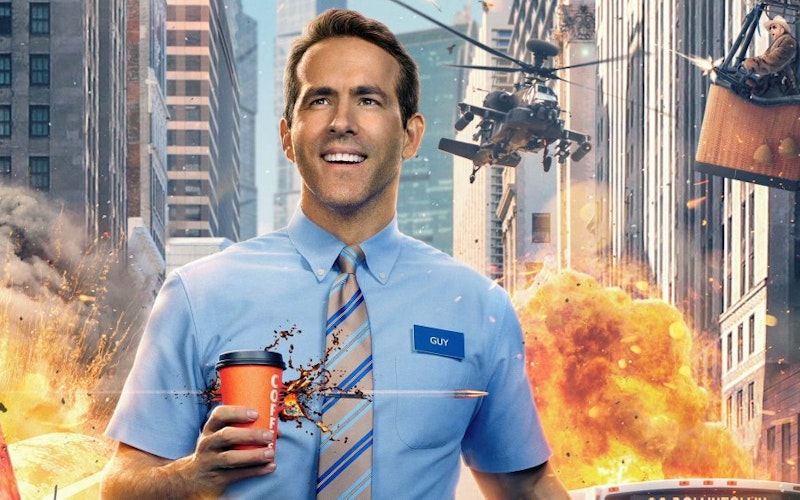
Movies
Free Guy and Biblical Freedom
Watching Free Guy is like reading a love letter to open-world video games.
The film is set against the backdrop of the fictitious video game Free City, where players customize their own character and complete tasks that are often achieved through violence and destruction. The movie’s rich and fleshed-out world speaks to the core appeal of these games: namely, how they offer the promise of unchecked freedom and liberation. Indeed, the “best” of open-world video games become the closest thing resembling actions without consequence, whether you are ruthlessly sinking enemy ships in Assassin's Creed IV: Black Flag or web-slinging your way through New York City’s skyline Spider-Man: Miles Morales.
Yet as Jimmie Fails says about the title city in The Last Black Man in San Francisco, “You can’t hate it unless you love it.” And so director Shawn Levy and screenwriters Matt Lieberman and Zak Penn are not above critiquing or deconstructing the open-world genre even as they lovingly recreate it. While Free Guy expertly translates the glee of playing such games, it also understands that the very appeal of such games can also be to their detriment. And in doing so, Free Guy offers a picture of how true freedom exists within boundaries.
Initially watching Free Guy, you would be hard-pressed to think it was offering anything like a critique. The game within the movie, Free City, offers a reality similar to our own, yet one that is able to be customized. (Reality+, if you will.) The only limit is the player’s imagination, which explains the zipliners with bazookas, bodyguards dressed in bunny suits, and hot-air balloons and pegasuses roaming with abandon.
All of which means that in the midst of this freedom, there’s chaos aplenty. The film’s protagonist, Guy (Ryan Reynolds), is a non-playable character (NPC) who exists as a bank teller. His single, programmed objective is to surrender money when real-life players’ avatars (designated by the distinctive sunglasses they wear) rob his bank. He has no reason to question anything until he encounters the “girl of his dreams”: Molotovgirl (Jodie Comer), a character in Free City controlled by player Millie (also Comer). As soon as he slaps on a pair of player shades, Guy sees the truth. Molotovgirl/Millie tells him that he is an artificial intelligence within a video game. Realization becomes the gateway to autonomy and he breaks free from his code, using his liberation to level up within Free City by doing acts of service and kindness. This shocks gamers and players all over the world and angers the game’s head developer, Antwan (played by a delightfully sardonic Taika Wahtiti).
Free Guy offers a picture of how true freedom exists within boundaries.
Indeed, although Guy has all of the freedoms available to him, he does not consider equality with other players something to be used to his own personal advantage. He does the inverse of what everyone else in Free City has been doing up until this point by actively stopping crime and helping save fellow NPCs who get brutalized by other players. In one scene, he defeats a player who has an NPC following him around like some sort of trophy wife. For a moment, viewers may be worried that Guy will simply take the woman (only credited as Bombshell but played by Camille Kostek) as part of his own entourage. Instead, he tells her, “You can do so much better than that guy . . . do whatever you want to do!” It is a small moment where Guy finds that freedom when exercised within boundaries is not only life-giving, but truly liberating.
This idea is fully realized in Free Guy’s ending. (Spoilers ahead.) After Free City is destroyed by a vengeful Antwan, Guy and the rest of the game’s inhabitants are transported to a new home: a game called Free Life. Millie and her friend (Joe Keery), a former employee of Antwan’s, designed Free Life as an open-world video game where artificially intelligent characters and players are allowed to organically grow and evolve. In contrast to the chaotic, violent world of Free City, Free Life oozes of Eden. There is still the same smorgasbord of colorful characters (dragons and dinosaurs run about), but it’s guided by the care and love of its designers. Guy and Free Life’s other inhabitants experience true flourishing. Truly, there is an order to Free Life and yet, within that order, there is great abundance.
This ending evokes the very beginning of Genesis, when God speaks the world into existence. God does not start creating randomly or sporadically; as if following a liturgy, there is a flow and structure to the birth of the world. Light divides the day and night; water divides the sky and earth. It is within these structures—boundaries—that God allows for gleeful freedom and expansion, a world teeming with living creatures. In a poignant way, Free Guy reflects this truest form of freedom: living freely not in chaotic playgrounds with no accountability, but within boundaries created by a loving creator.
Free Guy might not convince die-hard gamers deep into Skyrim or Grand Theft Auto to necessarily give up their time in those worlds (nor is the movie necessarily advocating for that). But at least it offers a biblically resonant counter to the philosophy that the best kind of world is an endlessly open one.
Topics: Movies